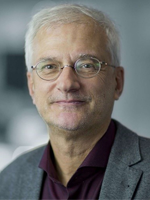Invited Speakers
Prof. Dr.-Ing. habil. Holger Theisel
Fakultät für Informatik, Institut für Simulation und Graphik, Magdeburg University, Germany
Title
Optimal Reference Frames, Scaling and Features in Visualization
Venue
Aula – University of Rostock, Main Building
Abstract
In Visualization, the success or failure of an analysis often depends on
the choice of some subtle parameters or design choices. While simple
heuristics are often sufficient, in some cases they make the analysis
miserably fail. We present three approaches in visualization where a
careful choice of optimal parameters results in completely new algorithms:
1) the choice of a reference frame for finding objective vortices in
flow visualization,
2) the choice of a scaling of high-dimensional data sets for finding
linear projections to 2D in information visualization, and
3) the choice of a feature definition along with numerical extraction
methods for visualizing recirculation phenomena in flows.
Bio
Holger Theisel is professor for Visual Computing at Magdeburg University
(Germany). He received his Ph.D. (1996) and habilitation (2001) degrees
from the University of Rostock (Germany), and had research stays at
Arizona State University (USA), ICIMAF Havana (Cuba), MPI Informatik
Saarbrücken (Germany), and Bielefeld University (Germany).
His research interests focus on scientific visualization as well as on
geometric design, geometry processing and information visualization and
Visual Analytics. He co-authored more than 70 papers in the top journals
in the field. He served as General Chair of the IEEE VIS 2018 conference
in Berlin.
Prof. Dr. rer. nat. Dr. techn. h. c. Dr.-Ing. E. h. Thomas Ertl
Visualization Research Center, University of Stuttgart, Germany
Title
Visualization and Analysis of Large Scientific Data – New Approaches for Volumes, Flows, and Particles.
Venue
Konrad-Zuse-Haus, A.-Einstein-Str. 22, HS037
Abstract
As size and complexity of data sets resulting from simulations and sensors continue to grow, more elaborate techniques for their interactive analysis and visualization are being developed. This talk presents some of our recent contributions focusing on dynamic volumes, multiphase flows, and particle data sets. For volumes we exploit similarity between time steps to select the most important characteristic temporal features, while still allowing exploration, and we develop adaptive algorithms for maintaining interactive frame rates by balancing quality and sampling errors.
In this context, a better understanding of the performance characteristics of visual computing systems is derived from large-scale measurements providing general guidelines for reporting runtime results. By direct multi-phase flow simulation, breakup and coalescence of droplets are studied which pose many visualization challenges like coupling the spatial representation with space-time diagrams showing the topological evolution or tracking droplet dynamics over time. We present our first attempts to learn interesting features in such complex 3D time series. In porous media, the behavior and distribution of bubbles influence physical properties of the material. We present an analysis pipeline which groups extracted bubbles and surrounding structures according to their similarity and clusters them, allowing visual comparison after registration. For large particle data sets, we report on recent results based on our MegaMol framework, especially rendering trillions of particles in-situ approaches based on raytracing on GPUs and CPUs.
Bio
Thomas Ertl received a MSc in computer science from the University of Colorado at Boulder and a PhD in theoretical astrophysics from the University of Tübingen. Since 1999 he is a professor of computer science at the University of Stuttgart in the Visualization and Interactive Systems Institute (VIS) and he is a co-director of the Visualization Research Center (VISUS). From 2015 to 2018 he served as Vice President of Research of the University and since 2019 he is the spokesperson of the SimTech Cluster of Excellence. His research interests include visualization, computer graphics and human computer interaction in general with a focus on volume, flow and particle visualization, parallel and hardware accelerated rendering, large datasets and interactive exploration, visual analytics of text collections and social media with applications to geographic information and digital humanities. Thomas Ertl served on numerous program committees and as a papers co-chair for many conferences in the field. From 2007 to 2010 he was the Editor-in-Chief of the IEEE Transactions on Visualization and Graphics and in 2011/2012 he served as Chairman of the Eurographics Association. He received the Outstanding Technical Contribution Award and the Distinguished Career Award of the Eurographics Association as well as the Technical Achievement Award of the IEEE Visualization and Graphics Technical Committee. In 2007 he was elected as a Member of the Heidelberg Academy of Sciences and Humanities. He received Honorary Doctorates from the Vienna University of Technology in 2011 and from the University of Magdeburg in 2014.


